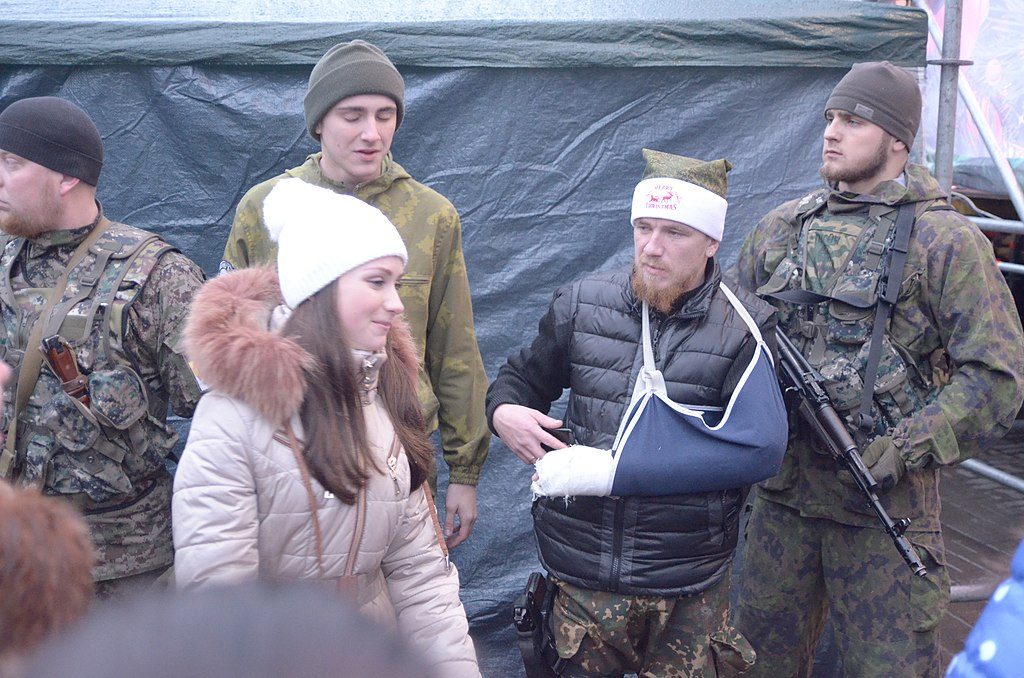
Image by Andrew Butko
The West-backed Ukraine and the Russia-backed self-proclaimed Donetsk People’s Republic and Lugansk People’s Republic keep creating an illusion of a peace process in the war-torn Donbass region. Reportedly, the two sides pulled back troops from a couple of villages ahead of an international summit on solving the Ukrainian crisis. At the same time, positional warfare goes on all over the front line.
Ukrainian and pro-Russia forces recently withdrew from Zolotoe and Petrovsky villages in the Donbass. Such a maneuver aims to simulate an de-escalation of the conflict, even though constant shelling in other sections of the front line never stopped. It should also pave the way for a meeting between Russian President Vladmir Putin and his Ukrainian counterpart Volodymyr Zelensky. Such hypocrisy provides the two leaders an opportunity to show their Western mediators that they are doing their best to find a solution for the conflict that erupted five years ago. In reality, however, sustaining peace is possible only if Russia returns the Donbass to Ukraine, which would be seen as an open betrayal of pro-Russia forces and also as another sign of Russian weakness.
At this point, it is extremely unlikely that the United States will abandon its successful Ukrainian policy and allow Russia to get away, which means that the Kremlin will have to make some serious concessions to the West. Russian leadership seems to be trying to find a way to give up the Donbass, but at the same time it is attempting to portray it as another geopolitical victory. Moscow is officially insisting on full implementation of the Minsk Agreements, signed in Belarusian capital in 2014 and 2015, which should provide the Donbass a special status within Ukraine. However, if the Kremlin allows Ukraine to reinstate full control over its state border with Russia – which is currently controlled by Donetsk People’s Republic and Lugansk People’s Republic – there are absolutely no guarantees that Kiev will actually implement any laws that would grant the special status to the region. Putin could blame his Ukrainian and Western partners of “deceiving” him, as he did numerous times in the past, but a bigger problem would be the fact that Zelensky openly said that he plans to resolve not only the Donbass issue, but the Crimea dispute as well.
In other words, if the Kremlin returns the Donbass to Ukraine, the West and Kiev will immediately start pressuring Moscow to start negotiating the status of Crimea which is de facto part of the Russian Federation. Ukraine, backed by the West, will also likely require from Russia to pay war reparations, which is something that the Kremlin would try to avoid, since its official position is that it is not involved in the conflict. Still, such demands would be another method of pressure on Russian leadership. Therefore, abandoning the Donbass would bring too much trouble to Russia. In addition, the Donbass is significant to Russia due to its energy resources. Presently, the Donetsk People’s Republic authorities, who control the Donbass mines, sell the coal to Russia who then exports it to Ukraine. In this lucrative business, Russia sells de-jure Ukrainian coal to Ukraine, and oligarchs on both sides make significant profit.
The ongoing conflict also brings profit to “war parties”, especially on Ukrainian side. Recently, radical Ukrainian nationalists, some of them tied with neo-Nazi groups, accused Zelensky of capitulating to Russia after he announced that he might grant special status to the Donbass. They also held several rallies in Kiev and other cities, and since some of them are part of the Ukrainian Interior Ministry the authorities in the self-proclaimed Donbass republics fear that the Azov battalion, or other Ukrainian nationalist or neo-Nazi groups, might seize the front line territory after pro-Russian forces withdraw.
It is unlikely that such actions will take place before the Putin Zelensky summit that should reportedly take place before the end of the year. The two sides will likely keep simulating the peace process, in spite of everyday shelling. At this point it is highly uncertain what will be the outcome of the talks, but there is a high possibility that German Chancellor Angela Merkel and French President Emmanuel Macron will act as mediators. According to the Kremlin, Putin and Merkel recently agreed that Ukraine should grant special status to the Donbass. However, since the United States is not officially involved in the peace process, it is improbable that there will be a serious progress at peace talks.
The war in the Donbass will end either if Russia capitulates and returns to territory to Ukraine, or if Moscow and Washington make some global arrangements that should include the status of the region. In the meantime, people of the Donbass will be held hostages of the geopolitical game played by Russia and the West.
- Nationalist Allies Battle Globalists For Soul Of US, Britain And Israel
- What Global Oil Markets Really Want


1 comment
Surely the author knows that Russia will NEVER give up Crimea and its only warm water port without a very serious fight, normally called a war. Whatever agreements reached about the rest of Ukraine, Russia will not accept a threat from Ukraine, the US, or NATO which endangers the Crimea region. Therefore, all agreements should keep this in mind when dealing with Russia.
Any strategist, analyst, or political operator who does not agree should be replaced.